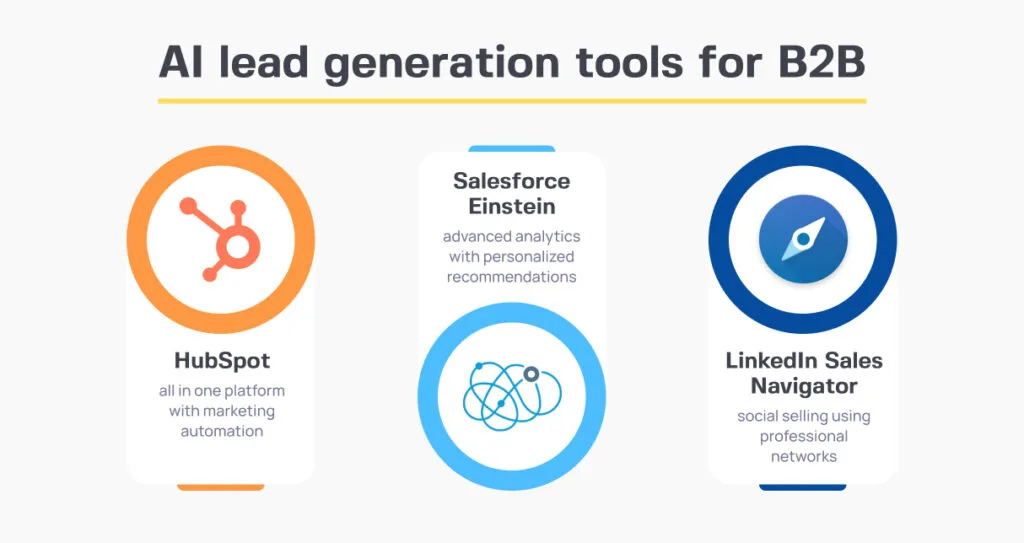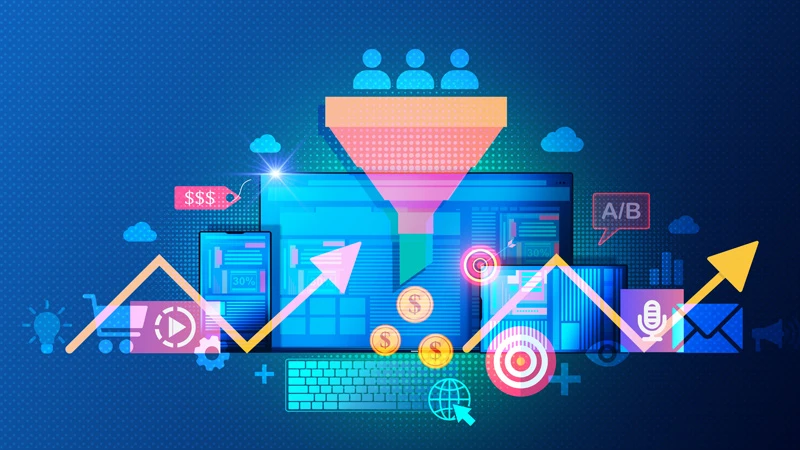How Growth Systems For B2B optimizes supply chain management
Wiki Article
Transform Your Company: Exactly How AI Automation Is Transforming B2B Procedures
AI automation is reshaping B2B procedures in considerable ways. Firms are adopting this modern technology to improve operations and enhance effectiveness. As jobs come to be automated, organizations can focus on calculated development instead of ordinary processes. The effects of these changes are profound, influencing whatever from consumer interactions to supply chain administration. Recognizing this change is important, as the future of service depend upon the efficient assimilation of AI into day-to-day operations. What lies ahead in this developing landscape?Comprehending AI Automation in B2B Context
As companies significantly look for efficiency, comprehending AI automation within the B2B context comes to be essential. AI automation describes the application of expert system innovations to enhance and enhance business procedures. In B2B atmospheres, this can manifest in various types, such as automating information entry, maximizing supply chain logistics, or improving inventory monitoring. Organizations leveraging AI automation can decrease operational costs, decrease human mistake, and boost efficiency. AI tools can assess large quantities of information to offer workable understandings, allowing notified decision-making. The integration of AI into B2B procedures not just changes traditional process yet also promotes dexterity and scalability, permitting companies to adjust to market changes quickly and properly. Embracing this innovation is important for staying affordable in today's electronic landscapeEnhancing Customer Experience Through AI
Exactly how can AI transform customer communications in the B2B sector? AI enhances customer experience by supplying individualized, prompt, and reliable service. Digital aides and intelligent chatbots can take care of questions 24/7, ensuring clients receive immediate reactions. Growth Systems For B2B. Predictive analytics allow services to prepare for customer demands, customizing offerings as necessary. AI-driven systems can assess consumer information, permitting targeted advertising and marketing strategies and improved interaction. Furthermore, belief evaluation tools examine client responses, assisting organizations adjust their solutions. By automating routine jobs, AI maximizes personnels to focus on high-value communications, cultivating more powerful partnerships. The assimilation of AI not only improves communication yet additionally constructs depend on and commitment, eventually elevating the overall consumer experience in the affordable B2B landscape
Improving Supply Chain Administration With AI
AI plays an important function in enhancing supply chain monitoring via predictive analytics and automated supply control. By leveraging predictive analytics, companies can anticipate demand variations and readjust their procedures appropriately. Automated supply systems better boost effectiveness by guaranteeing supply levels are kept, minimizing waste and improving general efficiency.Anticipating Analytics Benefits
While lots of services face challenges in taking care of complicated supply chains, anticipating analytics provides a transformative remedy by leveraging huge amounts of data to anticipate patterns and maximize operations. By evaluating historic data along with real-time inputs, predictive analytics makes it possible for business to identify patterns and anticipate future needs. This foresight permits for more educated decision-making, boosting effectiveness and reducing expenses. Additionally, services can proactively address prospective disruptions by predicting supply chain traffic jams and readjusting methods accordingly. The integration of anticipating analytics not just improves stock management but likewise fosters more powerful connections with distributors and customers with prompt reactions to market changes. Eventually, the fostering of predictive analytics equips companies to stay competitive in a progressively vibrant business environment.Automated Stock Control
As services increasingly count on anticipating analytics to maximize supply chain operations, automated inventory control emerges as an effective ally in this initiative. By leveraging AI-driven innovations, firms can boost accuracy in stock tracking, lower stockouts, and decrease excess inventory. Automated systems examine real-time information, allowing services to forecast need fluctuations and adjust stock degrees accordingly. This not just simplifies order gratification yet also enhances cash money circulation administration by minimizing holding expenses. In addition, AI can identify patterns in buying actions, allowing even more educated decision-making pertaining to distributor partnerships and procurement techniques. Eventually, automated inventory control not only boosts functional effectiveness yet also enhances consumer satisfaction by ensuring product availability, solidifying its role as a vital part in modern supply chain monitoring.Data-Driven Decision Making Powered by AI
In today's affordable landscape, organizations increasingly rely upon data-driven decision-making to improve operational performance and critical planning. Expert system plays a critical function in this transformation by assessing large quantities of information swiftly and properly. AI algorithms identify patterns, patterns, and abnormalities that human experts might ignore, enabling organizations to make informed decisions based upon real-time insights. This capacity enables firms to anticipate market changes, maximize resource appropriation, and tailor their offerings to consumer needs. Furthermore, AI-driven analytics assist in threat assessment and administration, making sure that companies can browse uncertainties successfully. By leveraging these innovative tools, companies not only enhance their decision-making procedures but likewise obtain an affordable advantage in their particular markets, promoting development and advancement.Automating Recurring Jobs to Boost Efficiency

Incorporating AI With Existing Company Procedures
When incorporating AI with existing service procedures, several organizations deal with obstacles. These difficulties often originate from a lack of understanding relating to how AI can enhance present process. Effective integration needs a detailed assessment of existing procedures to recognize locations where AI can add worth. Organizations should also ensure that their teams are geared up with the necessary skills to take advantage of AI devices effectively. On top of that, seamless integration pivots on the compatibility of AI modern technologies with heritage systems. Companies commonly discover it valuable to embrace a phased method, piloting AI applications in particular departments prior to a more comprehensive rollout. This approach permits for changes based on first responses, assuring smoother shifts and taking full advantage of the prospective benefits of AI automation in boosting performance and effectiveness.Future Trends in AI Automation for B2B Companies
As B2B business want to the future, boosted information analytics is set to play a crucial function in driving decision-making procedures. Intelligent process automation will certainly likewise become a key trend, boosting and streamlining procedures effectiveness. These developments promise to review improve how businesses operate, eventually leading to even more responsive and nimble organizations.Improved Data Analytics
While businesses significantly rely upon data-driven decisions, the duty of AI in improving information analytics is ending up being a lot more vital in B2B operations. AI innovations promote the collection and analysis of vast datasets, enabling firms to reveal valuable understandings that drive tactical planning. Predictive analytics powered by AI enables companies to anticipate market patterns and consumer behavior with greater precision. Additionally, equipment learning formulas boost information interpretation, identifying patterns that human experts might forget. This brings about more informed decision-making and enhanced source appropriation - B2B Automation Consulting. As B2B business continue to welcome AI-driven analytics, they can expect improved functional performance, improved client experiences, and an affordable edge in the market. The future of information analytics in B2B hinges on incorporating sophisticated AI capabilitiesSmart Process Automation
Smart Process Automation (IPA) is poised to change B2B procedures by effortlessly incorporating AI innovations with standard business processes. This ingenious method integrates robot process automation (RPA) with innovative AI capabilities, making it possible for companies to improve performance and accuracy. Companies can automate recurring jobs, such as data access and billing handling, allowing staff members to concentrate on critical campaigns. IPA additionally leverages artificial intelligence and natural language processing, boosting decision-making through real-time data evaluation. As businesses significantly embrace IPA, they can anticipate substantial price reductions and improved client experiences. Future patterns show an expanding dependence on IPA for scalability and flexibility, placing companies to flourish in an ever-evolving market. Welcoming IPA will certainly be vital for preserving competition in the electronic age.Often Asked Concerns
What Industries Benefit A Lot Of From AI Automation in B2B Workflow?
Manufacturing, logistics, finance, and healthcare industries benefit most from AI automation in B2B operations. These sectors utilize automation to improve performance, reduce expenses, simplify procedures, and improve decision-making through anticipating analytics and data-driven understandings.Exactly How Can Local Business Carry Out AI Automation Successfully?
Local business can apply AI automation efficiently by determining repeated jobs, picking appropriate devices, incorporating options slowly, training team, and constantly evaluating performance to maximize procedures, ensuring a smooth changeover and maximizing effectiveness. AI Automation For B2B.What Are the Prices Connected With AI Automation Implementation?
The expenses connected with AI automation execution normally consist of software program procurement, infrastructure upgrades, educating team, continuous upkeep, and prospective consultation costs. These costs can differ substantially based on the scale and complexity of the automation solutions selected.Exactly how Do I Measure ROI From AI Automation Initiatives?
To determine ROI from AI automation campaigns, one ought to examine price savings, efficiency enhancements, and earnings growth versus application expenses. Tracking crucial efficiency indicators in time gives valuable insights into performance and total return on investment.
What Skills Are Needed to Manage AI Automation Projects?
Efficient monitoring of AI automation tasks calls for skills in task administration, information evaluation, shows, and understanding AI technologies. Furthermore, strong communication, analytic capabilities, and versatility are important for navigating the complexities of such efforts.As services significantly look for performance, recognizing AI automation within the B2B context ends up being important. The combination of AI right into B2B procedures not only transforms standard workflows but likewise fosters agility and scalability, enabling companies to adjust to market changes quickly and successfully. While services increasingly rely on data-driven choices, the role of AI in enhancing information analytics is becoming much more vital in B2B operations. Smart Refine Automation (IPA) is poised to revolutionize B2B operations by seamlessly incorporating AI innovations with conventional organization procedures. Efficient administration of AI automation projects calls for abilities in task administration, data analysis, programming, and comprehending AI innovations.
Report this wiki page